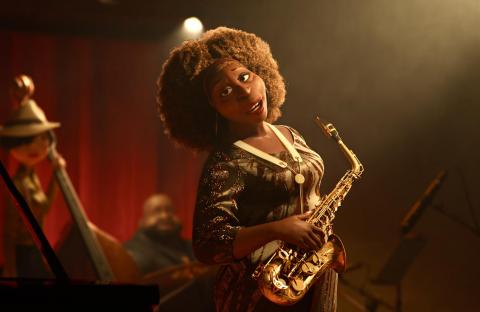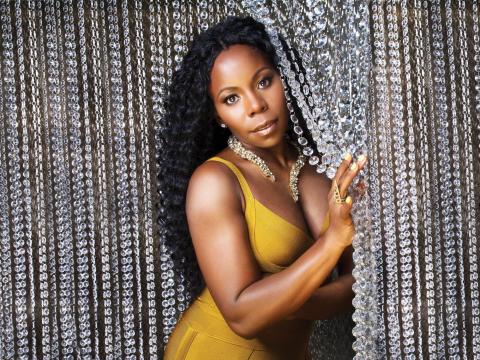Berklee Professor Brings Soul Music to Life

Dorothea Willams, a character in Pixar’s new film, 'Soul'
Image courtesy of Disney/Pixar
Tia Fuller has toured the world in Beyoncé’s band, performed a concert for President Barack Obama at the White House, and appeared on the Today Show, Good Morning America, Oprah, and at the Grammy Awards. But the Berklee professor says that none of that made her as nervous as playing for her latest gig.
Fuller is the saxophonist behind the music of Dorothea Willams, a character in Pixar’s new film, Soul. The character, voiced by the legendary actress Angela Bassett, is a renowned musician who leads a jazz quartet. The film, which also stars Jamie Foxx, Tina Fey, Questlove, Phylicia Rashad, and Daveed Diggs, tells the story of a band teacher who becomes separated from his body, then finds himself in the Great Before, a world where souls get their personalities before coming to Earth.
Soul will be available to stream exclusively on Disney+ starting Friday, December 25. We recently talked to Fuller about her role in the new film. Edited excerpts from the conversion are below.
How did you get this gig?
I received a call that Pixar was looking for a woman to play the saxophone for the animated movie that was coming out. I then spoke to the director at Pixar about details, and she told me that this character is a Black woman who is a “powerhouse” and top jazz saxophonist in New York that every musician wants to play with.
I had another performance that I had committed to at Princeton University the same weekend of the Pixar taping. But, luckily, I was able to switch it around (thanks for your flexibility, Rudresh Mahanthappa).

Tia Fuller
What does it mean to you to be the sound of Dorothea Williams' music, and to be involved in this film?
I am so humbled and honored to be the sound for Dorothea Williams. First off, as a Black woman, I recognize that I am standing on the shoulders of those Black women who have come before—in history and in “her-story” of jazz music. Black female instrumentalists who have helped shape, mold, and define what we know as jazz today, such as: Mary Lou Williams, Viola "Vi" Burnside, Elvira "Vi" Redd, Ernestine “Tiny” Davis, Lil Hardin Armstrong, Clora Bryant, and the list goes on and on.
Children will now grow up to see that it’s not taboo to see a Black woman play the saxophone...and that jazz...is as “cool” as the popular music of today.
—Tia Fuller
To be the saxophonist for a Black woman in this film is to say that representation is imperative—that diversity and inclusivity amount to deconstructing marginalizing views and reconstructing a more accurate account of our strength and influence in society and music.
Tia Fuller (left) with Angela Bassett at Clive Davis’s Grammy Party in 2019.
With this film, children will now grow up to see that it’s not taboo to see a Black woman play the saxophone, or an Asian woman play the bass or trombone, and that jazz is deeply embedded into the fabric of our music history and is as “cool” as the popular music of today. It will also reacquaint our children with musical instruments and the importance of live music, since many schools have eliminated music programs.
When I travelled to L.A. to record for this film, Pixar hadn't yet decided who was going to be the voice of Dorothea Williams. Ironically enough, I had a chance to meet Angela Bassett on the red carpet at Clive Davis’s Grammy Party in 2019. I was excited to later find out that she was the voice for Dorothea Williams, the quintessential image for a voice for a powerful and regal character. What an honor!
Is this your first role in an animated feature? What were some of the most challenging and surprising aspects of the experience?
This was my first time performing in an animated film, and, to be completely transparent, of all of the playing situations that I have been in, I was most nervous about this one. You walk into your recording booth knowing that whatever you played was representing a voice for a Pixar film. And, not only was I recording with the great Roy Haynes, Jon Batiste, Linda Oh, Marcus Gilmore, but there was a room of Pixar directors listening to every note that we played to shape this movie.
One of the most surprising elements of this recording was seeing how Pixar are masters of “minutia,” purpose, and patience. Upon stepping into the studio, the team was so warm and inviting. As I was setting up my horn, they came in and were setting up the microphone and video cameras. One video camera on my face and body and another on my fingers. They said that they were videotaping my actual fingerings, so that the animated character will play the exact same fingerings. They did this with every single instrument in the studio, and it’s amazing to see the end result.
Something else that caught me by surprise is that Pixar changed Dorothea’s character and saxophone to emulate my image. Initially, they had a brown-skinned Black woman with a high bun and a bandana playing the tenor. But upon seeing the trailers, I saw the character shift to a darker-skinned mid-sized Black woman, with mid-length curly hair (how I had my hair at the time), playing an alto saxophone with a Vandoren mouthpiece and ligature. They were impeccable with details of all our body movements and motions.
It’s extraordinary to know that Pixar had a diverse committee of Black artists and consultants to help construct the authentic cultural narrative of Soul. I want to thank the entire team, which included my good friend, Berklee’s own Terri Lyne Carrington, as well as Herbie Hancock, Questlove, and Dr. Johnnetta Cole, the former president of Spelman College, my alma mater, to name a few.
